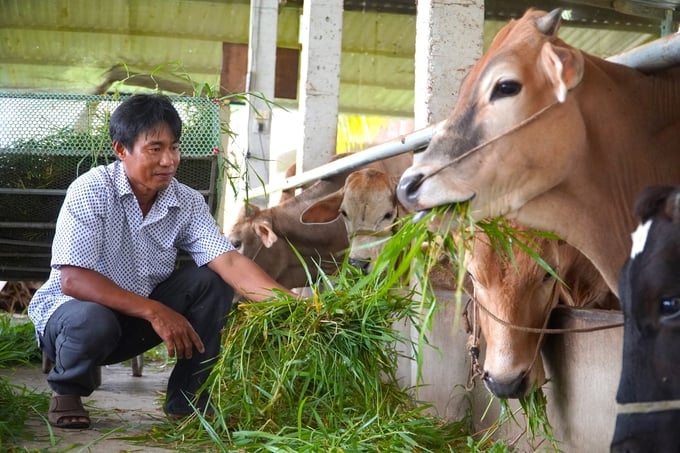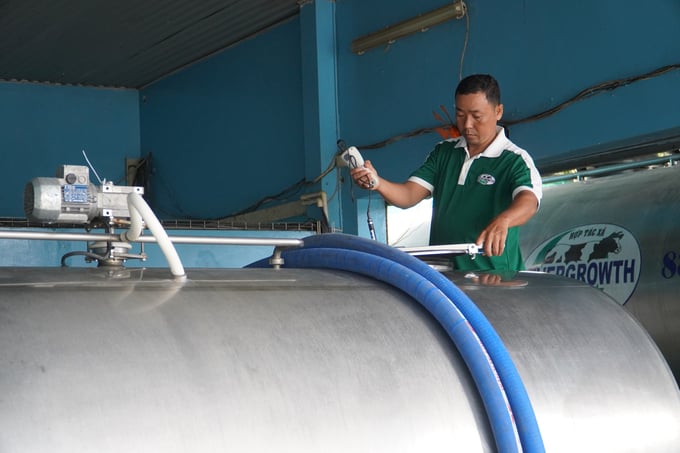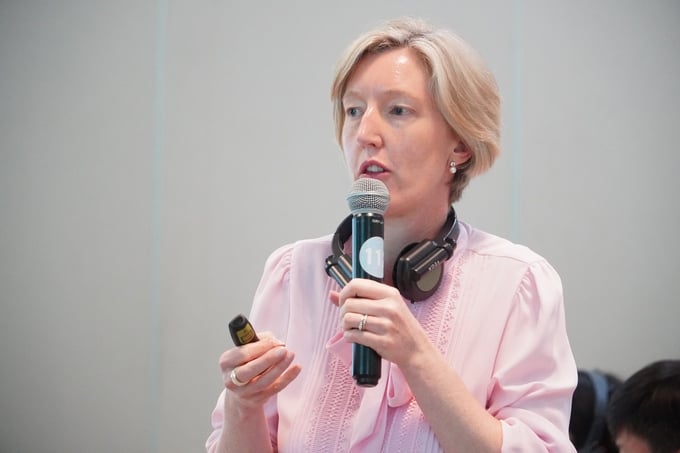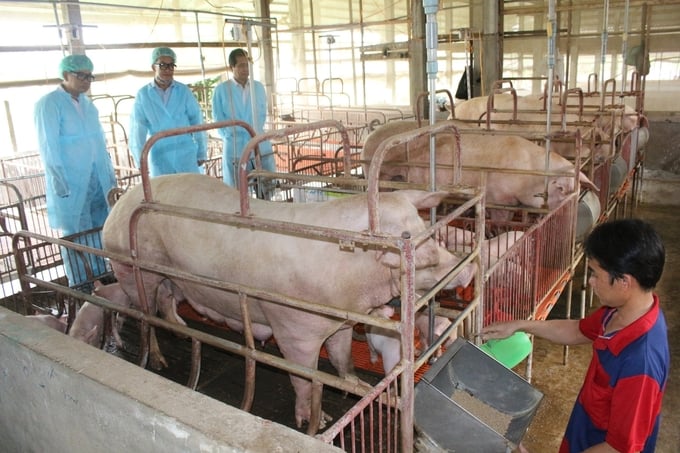May 23, 2025 | 20:37 GMT +7
May 23, 2025 | 20:37 GMT +7
Hotline: 0913.378.918
May 23, 2025 | 20:37 GMT +7
Hotline: 0913.378.918
In essence, the livestock industry assures the supply for the domestic demand of 100 million people and over 10 million tourists while contributing to the global food system. Despite the global economic decline, diseases, and climate change, the livestock production industry in 2023 maintained a growth rate of 5.7% in comparison to 2022, according to statistics from the Department of Livestock Production (Ministry of Agriculture and Rural Development).
Vietnam occupies the fifth position in the global pig herd hierarchy, with over 30 million pigs. It also rates sixth in pork production, with the capacity to supply nearly 5 million tons of live meat annually. In addition, the poultry flock comprises 558 million birds, with 102 million waterfowl, placing it second in the globe only after China. The total cattle herd is estimated to be approximately 8 million. In terms of these figures, the livestock industry has produced 7.8 million tons of live flesh of all varieties, 19.2 billion eggs, and 1.2 million liters of raw milk.

Vietnam's livestock industry has undergone a strong transformation towards concentration and is known to the world for its capacity to produce livestock products. Photo: Kim Anh.
Additionally, Vietnam has become Southeast Asia's primary producer of animal fodder, with a production volume exceeding 20 million tons of various types. In addition to providing domestic livestock, it exports goods to countries in the region at a value of approximately USD 1.5 billion. The value of the livestock sector influences the GDP of the complete agricultural sector 26%.
Nevertheless, the intricate developments of diseases, environmental contamination, food safety, and reliance on imported inputs present obstacles. In particular, the domestic livestock sector is distinguished by integrating large-scale, medium-scale, and small-scale husbandry. Therefore, adhering to common principles when implementing biosecurity measures in livestock husbandry is difficult.
Assoc. Prof. Dr. Pham Kim Dang, Deputy Director of the Department of Livestock Production, acknowledged the sector's challenges and stated that the industry's recent development has not been sustained.
The livestock industry has recently prioritized sustainable development, policy-making, and institutional structures. This approach is tailored to Vietnam's unique conditions and characteristics and is based on international integration. Mr. Dang underscored the significance of fortifying the relationship between the reduction of disease incidence, the reduction of antimicrobial use, and the implementation of effective biosecurity interventions. This contributes to the implementation of Decision 300/QD-TTg on the National Action Plan for Transforming the Food System toward transparency, responsibility, and sustainability by 2030.

Associate Professor Dr. Pham Kim Dang, Deputy Director of the Department of Livestock Production, emphasized the importance of strengthening the link between effective biosafety interventions and reducing disease incidence and antibiotic use. Photo: Kim Anh.
Currently, the Department of Livestock Production is drafting and presenting a Decree to the Government that will enhance the efficacy of livestock and encompass a broader range of contents. This includes assistance with relocation and domestic livestock farming to guarantee disease control and biosecurity.
"The livestock sector's success or failure is primarily determined by biosecurity. Nevertheless, the country continues to encounter numerous distinctive obstacles in pursuing biosecurity, as small-scale farming and slaughtering remain prevalent. Livestock farming will be more sustainable and efficient if all localities and producers fully comprehend and adhere to the strategic orientation", Mr. Dang underscored.
The Department of Livestock Production has recently implemented seven pilot biosecurity chains and disease control models for large-scale pig farming corporations, with the support of the World Bank (WB). These entities are instrumental in the development and dissemination of other livestock enterprises and models.

The livestock industry ensures supply for domestic demand and participates in the world's food system. Photo: Van Vu.
The Department of Livestock Production, in collaboration with Sustainable Food Systems Ireland (SFSI) under the Ministry of Agriculture, Food, and the Marine of Ireland, recently conducted training to improve the capacity to develop effective biosecurity strategies within the framework of the Ireland-Vietnam Food Agriculture Partnership. The Embassy of Ireland in Vietnam provided support. This training was designed for livestock and veterinary officers, research institutes, universities, and farm management administrators in the Mekong Delta.

Dr. Michelle Riblet, the expert in SFSI, introduces biosecurity measures and their importance in disease control. Photo: Kim Anh.
According to Dr. Michelle Riblet, an expert in SFSI, biosecurity measures are designed to prevent the introduction and dissemination of infectious agents in farms. In a broader sense, effective biosecurity practices are essential for safeguarding and enhancing the health of animals, thereby minimizing the likelihood of disease outbreaks and transmission during production activities. In addition to safeguarding the commercial value of agricultural products, effective biosecurity measures also enhance productivity, thereby generating long-term economic benefits by reducing dependence on antibiotics.
Dr. Riblet observed that the food supply chain, which spans from farm to consumer, is detailed and encompasses numerous stakeholders, including primary producers, processors, packagers, distributors, transporters, consumers, and policymakers. Biosecurity concerns may indirectly or directly affect each of these stakeholders. For example, diseases may manifest at any stage of the supply chain, including the farm, processing, or transportation. Consequently, it is essential to comprehend transmission pathways to select the most suitable measures and maintain a close grip on pathogens.
Dr. Riblet underscored the necessity for Vietnam's livestock sector to prioritize the application of biosecurity principles and classifications to create a national biosecurity strategy, categorize biosecurity, and examine successful initiatives that have reduced antibiotic use in Ireland. Establishing a national biosecurity strategy that is effective in addressing hazards and improving the livestock sector's preparedness for disease outbreaks is imperative. This strategy should encompass the identification of contaminated and non-infected regions within the country and the implementation of specific planning.

Developing an effective biosecurity strategy at the national level is crucial to helping the livestock industry effectively deal with disease outbreaks. Photo: Van Vu.
A Memorandum of Understanding (MOU) was signed in March 2023 between the Department of Agriculture, Food, and the Marine (DAFM) of Ireland and the Ministry of Agriculture and Rural Development (MARD) of Vietnam. A foundation for enhancing bilateral relations and promoting technical development and advancement in both countries was established by the mutual agreement of both parties to maintain continuous dialogue and regular consultations on agricultural sector-related matters. Furthermore, both nations pledged to implement the requisite measures to foster, facilitate, and advance agricultural collaboration.
Translated by Linh Linh

(VAN) The mutual export of agrifood products between the European Union (EU) and the United Kingdom (UK) must occur again without certification, border controls or other red tape. This was agreed at the UK-EU summit.
/2025/05/22/5121-2-173645_677.jpg)
(VAN) NBSAP Tracker identifies strengths and areas for improvement in the National Biodiversity Strategy, based on each region’s priorities and capacities.

(VAN) The draft amendment to the Circular on rice export trading stipulates a periodic reporting regime for rice exporting enterprises.

(VAN) Dong Thap farmers attained an average profit margin of 64% during the summer-autumn 2024 crop (first season), while An Giang and Kien Giang farmers followed with 56% and 54%, respectively.

(VAN) As a doctoral student doing research on renewable energy and electrification at Harvard University, the author shares his musings on electricity, nature, and countryside memories.

(VAN) The decree on Extended Producer Responsibility (EPR) ensures transparent management and disbursement of support funds, avoiding the creation of a “give-and-take” mechanism.

(VAN) Hue City rigorously enforces regulations regarding marine fishing and resource exploitation, with a particular emphasis on the monitoring of fishing vessels to prevent illegal, unreported, and unregulated (IUU) fishing.